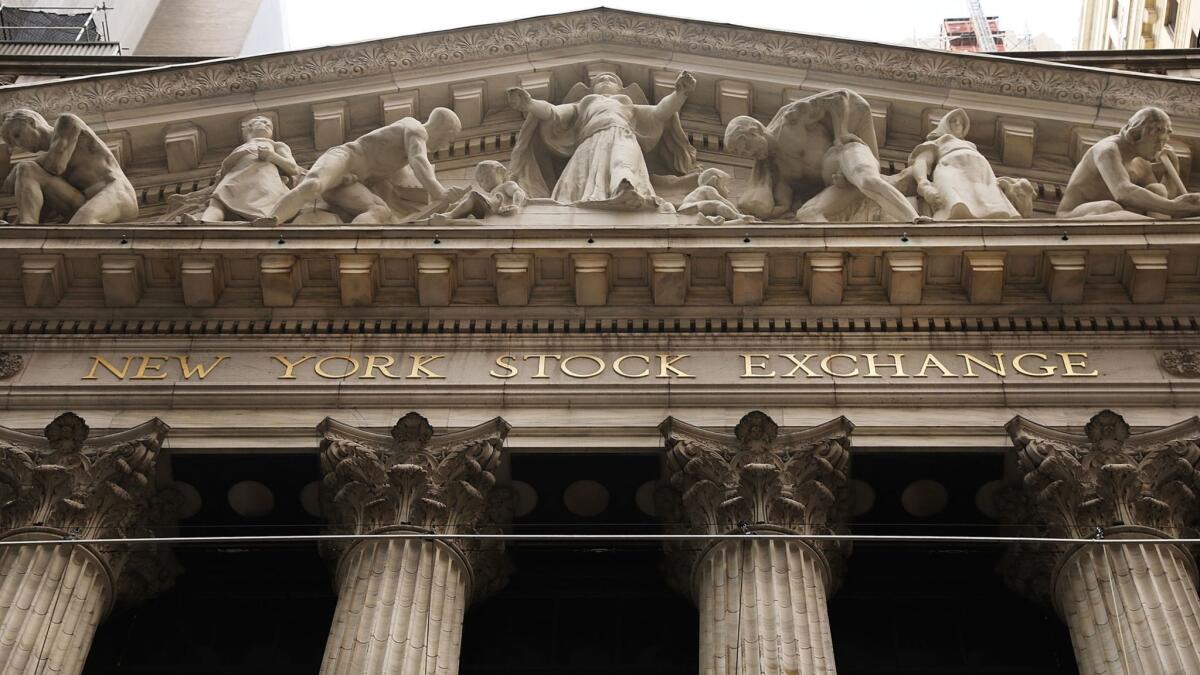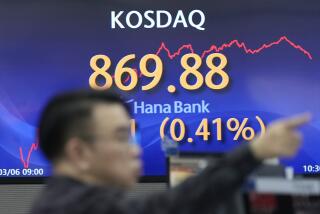Stocks sink as technology rally fades; Qualcomm drops

U.S. stocks fell Tuesday and a seven-day surge in technology shares ended after President Trump, citing national security, blocked Singapore-based chip maker Broadcom’s effort to buy Qualcomm.
The Dow Jones industrial average climbed as much as 197 points early Tuesday after investors were pleased with a Labor Department report that showed inflation stayed in check last month. But the gains soon faded.
Technology stocks were at record highs after a recent rally. Although Qualcomm had rejected all of Broadcom’s takeover offers, investors are now wondering if other deals might also be blocked and if companies will hesitate before making bids for overseas competitors.
“I don’t think we’ve started to price in protectionism on a broader level,” said Gina Martin Adams, chief equity strategist for Bloomberg Intelligence.
The Standard & Poor’s 500 index fell 17.71 points, or 0.6%, to 2,765.31. The Dow Jones industrial average slid 171.58 points, or 0.7%, to 25,007.03. The Nasdaq composite retreated 77.31 points, or 1%, to 7,511.01, its first decline after seven straight gains. The Russell 2000 index of smaller-company stocks fell 9 points, or 0.6%, to 1,592.05.
Qualcomm is one of the biggest makers of processors that power smartphones and other mobile devices. The company — as well as rivals in other countries — are getting ready to build next-generation 5G wireless networks. Trump’s decision followed a recommendation from the Committee on Foreign Investment in the U.S., which said Broadcom might cut back on research and development spending.
Qualcomm slid 5% to $59.07. Broadcom rose more than 3% early in the day but then erased that gain, finishing down 0.6% at $261.22. Intel, a competitor, edged up 0.5% to $51.78. The Wall Street Journal reported Friday that Intel wanted to stop Broadcom from acquiring Qualcomm and was thinking about trying to buy Broadcom to make that happen.
Trump also cited national security risks this month in announcing tariffs on imported aluminum and steel, and investors appeared to be wondering if at least one other deal will face new obstacles. In November, Bermuda-based chip maker Marvell Technology Group agreed to buy competitor Cavium for $6 billion. On Tuesday, Cavium slid 4.4% to $86.95 and Marvell sank 5.9% to $22.94.
The U.S. government has blocked deals by Chinese companies in the last few years under both President Obama and Trump, but Adams of Bloomberg Intelligence said investors are more focused on the issue now.
“We no longer have tax reform dangling in front of us,” she said. “It’s adding to an environment in which the market is a bit more nervous.”
The government said prices paid by consumers rose 0.2% in February, matching estimates. Excluding food and energy costs, prices have risen 1.8% in the last year. Prices jumped in January. Over the last month investors have worried about the prospect of faster inflation, but Tuesday’s price report and Friday’s monthly jobs report suggest inflation isn’t moving any more rapidly than in the recent past.
“If you put the two of them together it paints a very clear picture of an economy that’s operating at a very high level, that’s showing some inflation, but not overheating inflation,” said Rick Rieder, BlackRock’s chief investment officer of global fixed income.
Rieder said that in general, service costs are rising and the costs of goods are falling, although clothing prices have bounced back a bit recently.
With investors expecting slower gains in interest rates, bond yields fell. The yield on the 10-year Treasury note slipped to 2.85% from 2.87%. Faster inflation probably would lead the Federal reserve to raise interest rates more quickly. Investors feared that could slow the economy and the market’s gains.
Lower bond yields mean lower interest rates, and that weighed on bank stocks. Bank of America shares fell 1.5% to $32.36.
Companies that are considered bond proxies, such as utilities and real estate investment trusts, did better than the rest of the market. They often move in the opposite direction of bond yields because investors seeking income buy those stocks for their big dividend payments.
Benchmark U.S. crude slumped 65 cents, or 1.1%, to $60.71 a barrel. Brent crude, used to price international oils, fell 31 cents to $64.64 a barrel. Wholesale gasoline fell 1 cent to $1.89 a gallon. Heating oil rose 1 cent to $1.87 a gallon. Natural gas rose 1 cent to $2.79 per 1,000 cubic feet.
Gold rose $6.30 to $1,327.10 an ounce. Silver rose 9 cents to $16.63 an ounce. Copper rose 1 cent to $3.14 a pound.
The dollar rose to 106.61 yen from 106.35 yen. The euro rose to $1.2397 from $1.2336.
In overseas markets, Germany’s DAX slid 1.6%, Britain’s FTSE 100 shed 1.1%, and the CAC 40 in France lost 0.6%. The Japanese Nikkei 225 index gained 0.7%. The Kospi of South Korea advanced 0.4%. In Hong Kong, the Hang Seng was unchanged.
UPDATES:
3:45 p.m.: This article was updated with closing prices, context and analyst comment.
10:15 a.m.: This article was updated with market prices and context.
This article was originally published at 7:05 a.m.






